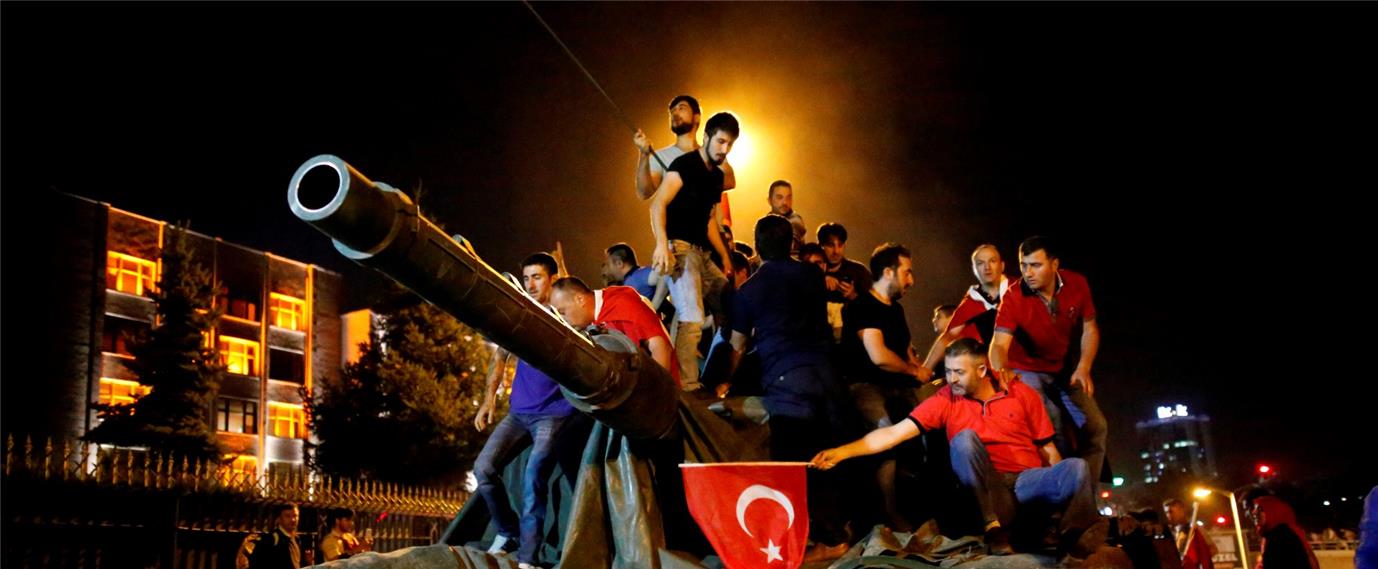عادت محاولة الانقلاب العسكري الفاشل على الحكم في تركيا (16 يوليو/تموز 2016) لتكون حدثاً جديدة يؤكد ازدياد فاعلية وسائل التواصل الاجتماعي وأدواته المتجددة في خدمة الصحافة والصحفيين وفي تحريك الرأي العام وحشد الجماهير من كافة أنحاء العالم ليكونوا جزءاً من حدث آني فارق ومؤثر.
وإلى جانب استخدام مواقع التواصل الاجتماعي من فيسبوك وتويتر خاصة، كأداة لنقل الأخبار وجمعها عبر استخدام هاشتاغ موحد، استخدمت خدمة البث المباشر في موقع فيسبوك وميزة الـ "بريسكوب" في موقع تويتر بشكل مكثف لم يحصل خلال الأحداث الأمنية التي عاشتها تركيا في الفترة الأخيرة.
فبالإضافة إلى نقل الخبر مكتوباً، تمكّن الناشطون والصحفيون الذي تواجدوا في أنحاء المدن التركية من استخدام هواتفهم الذكية لنقل المشهد بشكل مباشر، ومنهم من اختار التعليق عليه ومنهم من لم يفعل. وعليه، شهد ملايين من مستخدمي فيسبوك وتويتر الحدث بشكل مباشر أثناء وجودهم في مكان آمن، ودون تخطيط مسبق، مما يثبت فعالية أداة البث المباشر للتفاعل الفوري مع الأحداث المفاجئة وتعويض غياب وسائل الإعلام التقليدية لنقل الأحداث.
ولم يقتصر استخدام أداة البث المباشر على المواطنين والصحفيين الذين تواجدوا صدفة وسط الأحداث فقط، فقد استخدمتها أيضاً قناة "تي ار تي وورلد" التركية الناطقة بالإنجليزية بعد التشويشات التي حصلت وأدت لانقطاع بث القناة عبر التلفاز، فبثّت عبر صفحتها في موقع فيسبوك لمدة تزيد عن ساعة ونصف من الاستوديو، وكررت ذلك فيما بعد لنقل الصورة من الميدان بحسب مراسليهم.
وإن أردنا النظر بتمعن للتغييرات التي تجريها أداة البث المباشر على تجربة المتلقي في متابعة الأحداث، فيمكن الوقوف عند عدة نقاط. أولاً كون البث عن طريق موقع فيسبوك أو تويتر فإن كل فرد بالمجتمع الافتراضي لديه القدرة على أن يكون قريباً من الحدث بنفس المقدار، أي كغيره من المستخدمين المهتمين بغض النظر عن مكانه جغرافياً. وفي حين يمكنّنا الحضور لقلب الحدث من متابعة تفاصيله في مكان معين، تعطي خاصية البث المباشر الفرصة للمشاهد مستخدم فيسبوك أو تويتر لمتابعة مجريات أحداث آنية في عدة أماكن بنفس الوقت، مما يجعله على اطّلاع أكبر ويشكّل لديه مشهدا بانورامياً يجمع قطع الحدث الكبير المركّب.
من جانب آخر، نظراً لأن البث المباشر يتم عبر شبكة اجتماعية وليس قناة تلفزيونية وعلى يد شهود عيان ومستخدمين غير متخصصين في الغالب، فهو يقلل من الرقابة المفروضة على المعلومة ويخلّص المشاهد من الوقوع في فخ التوجيه الذي تحاول جميع وسائل الإعلام فرضها على المشاهد بطرق متعددة منها انتقاء المشاهد المعروضة وتحرير المقاطع المصورة لحدث معين واختيار زوايا التصوير وإرفاق التعليق الصوتي الموجّه.
واستناداً لأن البث المباشر يؤدي في جوهره لنقل الأحداث كما هي دون توجيه مقصود أو مونتاج، ومن زاوية نظر شاهد العيان، فهو يساهم في التحقق من الخبر المنقول عبر شهود العيان لوسائل الإعلام الرسمية، الذين اعتادوا على استقبال شهادات الناس عبر الاتصالات أو الكلمات دون أن يتسنى لهم دائماً التحقق من دقة المعلومة. وعليه فإن وجود أداة البث المباشر تساهم في التحقق من المعلومات والأخبار، وتقلل خطر الوقوع في الأخطاء المهنية أثناء التغطية.
وفي هذا السياق يطرح سؤال حول إمكانية إيجاد مصطلح جديد مثل "شاهد العيان الافتراضي"، الذي يشير لمستخدم فيسبوك أو تويتر المتابع للبث المباشر من قلب الحدث ويمكن أن يتحول لناقل موثوق للمعلومة كونه شهدها فور حدوثها وعاش تجربة مشابهة إلى حد كبير لتجربة المصوّر. وفي نفس السياق يمكن القول إن تفعيل أداة البث المباشر عبر مواقع التواصل الاجتماعي التي تحولت لمجتمعات افتراضية واسعة النطاق وكثيرة العدد، يفتح المجال أمام تغيير وتوسعة تعريف شاهد العيان ليشمل المتابع الافتراضي المتفاعل فورياً مع الأحداث.








































